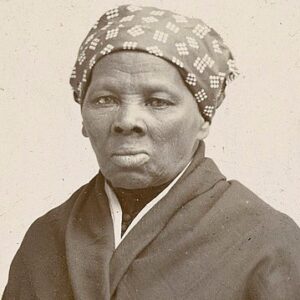Harriet Tubman, née Araminta Ross, was born around the year 1820 into slavery in Maryland. On the plantation, her mother was a cook, and her father worked around timber. From a very young age of only about five, Ross began to work. She was a domestic servant.
At the age of twelve, she tried to keep an overseer from beating another slave. She suffered a head injury from an iron weight thrown by an overseer, which struck her rather than the other slave. As a result, she struggled with seizures and headaches for her entire life. In a way, this marks the beginning of her abolitionist struggle.
Further, she became deeply spiritual as she now experienced visions from God. After her father’s owner died in 1840, the family was supposed to be let free. However, their new owner did not want to free them. In around 1844, she married a free Black man called John Tubman. At the same time, she adopted her mother’s name.

✟ March 10, 1913, Auburn, NY, USA
Harriet Tubman – Abolitionist
After another very demanding five years in slavery, Tubman escaped with her two brothers on September 17th, 1849. However, the brothers soon chose to return to slavery. She came to Philadelphia but felt lonely without her family.
Hence, following December, she managed to free her sister. She also helped escape dozens more between 1850 and 1860. The escaped slaves traveled through hidden routes and safe houses until they reached free states and Canada. The system was called The Underground Railroad.
During the American Civil War, Tubman served as a scout, spy, and nurse. When the war ended, she continued to fight for civil rights. Besides taking part in the early women’s suffrage movement, Tubman also raised funds for the freed ex-slaves. In 1908, she opened a home for the aged.
She was nicknamed “Moses of her people” for her dedication. One of the most inspirational abolitionists (fighters against slavery) in American history died on March 10th, 1913, in Auburn, New York. Harriet Tubman was around 90 years old. The land where she died belonged to her.
“I freed a thousand slaves I could have freed a thousand more if only they knew they were slaves.”
Harriet Tubman
